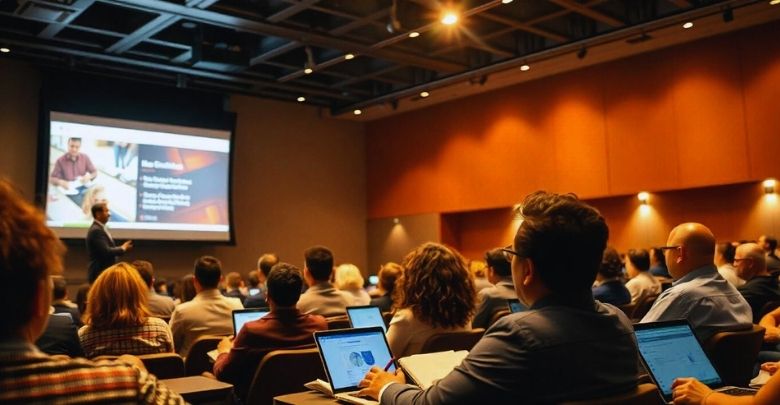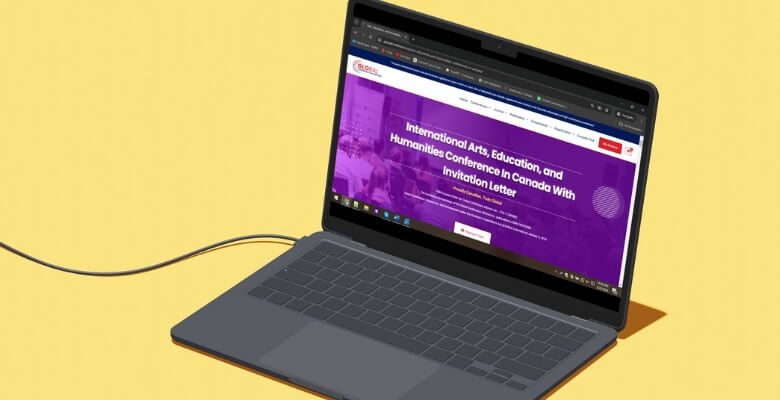Attending an academic conference can be a valuable experience for anyone interested in a particular field. These conferences are not just for scholars; they offer opportunities for learning, networking, and professional growth. So, you might wonder, “Do I need to be a scholar to attend an academic conference?”
No, you don’t need to be a scholar to attend an academic conference. Many conferences welcome attendees from various backgrounds, including students, professionals, and enthusiasts interested in the conference’s topic.
Keep reading to discover how you can benefit from attending an academic conference, regardless of your academic status.
What Does the Academic Conference Entail?
Academic conferences gather professionals, researchers, and students, sharing fresh ideas across study fields. These events encourage discussions on trending issues, practical findings, and collaborative research topics. Attendees can build connections, exchange insights, and discover different perspectives within their discipline. Many find opportunities to attend an upcoming academic conference to deepen their knowledge and network with industry experts.

During the conference, speakers present detailed research, often sparking engaging questions and thought-provoking ideas. Participants also gain chances to present their own work, boosting their professional visibility. Workshops and panel discussions provide real-world applications for theoretical knowledge, enhancing learning and development. Overall, these conferences inspire attendees to stay updated with the latest trends, strengthening their field expertise.
Why Attending Academic Conferences is Important?
Attending academic conferences offers numerous benefits for personal and professional development. These events provide opportunities for learning, networking, and presenting research. Here are some key advantages of participating in academic conferences.
Networking Opportunities
Academic conferences allow you to connect with professionals in your field. These interactions can lead to valuable collaborations and friendships. Networking helps build a supportive professional community. Engaging with peers enhances your career prospects.
Presenting Your Research
Presenting your research at a conference showcases your work to a wider audience. This exposure can lead to feedback that improves your research. Sharing your findings helps establish your reputation. It also boosts your confidence and presentation skills.
Learning from Experts
Conferences feature talks and workshops led by industry leaders. Attending these sessions provides insights into the latest research and trends. Learning from experts inspires new ideas and approaches. It keeps you updated with the latest advancements.
Professional Development
Workshops and sessions at conferences focus on skill enhancement. These activities help you develop new competencies and refine existing ones. Engaging in professional development is crucial for career growth. It ensures you remain competitive in your field.
Exposure to New Ideas
Conferences gather diverse perspectives and innovative ideas. Exposure to new research broadens your knowledge base. This can inspire fresh approaches to your work. Engaging with different viewpoints encourages creativity and innovation.
Building Your Academic Profile
Participating in conferences enhances your academic reputation. It demonstrates your commitment to staying current in your field. Presenting and publishing your work increases your visibility. This can lead to more recognition and career opportunities.
Access to Resources
Conferences often provide access to valuable resources, such as research papers and industry reports. These materials can benefit your work and studies. Access to resources helps you stay informed. It also supports your ongoing research efforts.
Do I Need to Be a Scholar to Attend an Academic Conference?
No, you do not need to be a scholar to attend an academic conference. Academic conferences welcome diverse attendees, offering opportunities for growth and learning beyond traditional academic boundaries. These gatherings attract a wide range of participants, from scholars and students to industry experts and enthusiasts, all eager to explore innovative ideas and form valuable connections.
Broad Participation Opportunities
Academic conferences encourage inclusivity by welcoming individuals from different backgrounds and experience levels. Students, industry professionals, and enthusiasts find these spaces valuable for learning and engaging with new ideas. This diverse mix of attendees fosters a collaborative environment where everyone gains insights, regardless of their academic status.
Anyone interested in a field can attend, making conferences accessible and enriching for a wide audience. This openness allows newcomers and experts to learn from one another, breaking down hierarchical barriers. By attending, individuals experience a unique blend of academic and practical knowledge-sharing.
Rich Networking Environment
Conferences provide a space where meaningful networking occurs, often leading to significant professional relationships. Attendees connect with peers, mentors, and thought leaders from around the world, building a web of support. These connections can lead to collaborations, job opportunities, and lasting friendships within the industry.
The networking environment at conferences is dynamic, encouraging discussions across various fields and specialties. This blend of disciplines enriches the experience, making it more than just an academic event. The personal interactions enable participants to build contacts that support their growth long after the conference ends.
Access to Expert Insights
Conferences provide direct access to expert insights, allowing attendees to engage with leading voices in their fields. Speakers share research and developments that might not yet be published, giving participants a first look at new ideas. This firsthand knowledge equips attendees with cutting-edge information they can apply in their own work.
Having access to these experts opens doors to mentorship and guidance, which can be invaluable for personal development. Direct interaction with speakers allows participants to ask questions, gain clarity, and deepen their understanding. These insights empower attendees, enhancing their learning and future career potential.
Open Discussion and Idea Exchange
Conferences create an environment where open dialogue is encouraged, allowing ideas to flow freely. Panels, group discussions, and Q&A sessions foster an atmosphere of learning, where participants feel comfortable sharing their viewpoints and understanding the academic conferences in depth. This two-way exchange helps broaden perspectives, enriching the learning experience.
These discussions allow attendees to approach topics from various angles, fostering innovative thinking. Engaging with diverse viewpoints often sparks inspiration and uncovers new solutions to complex problems. By exchanging ideas openly, attendees gain a more comprehensive understanding of issues and trends in their field.
Opportunities for Personal Growth
Attending a conference is a unique opportunity for personal growth, and building skills and confidence. Participating in discussions and presentations helps attendees sharpen their communication abilities. This active engagement encourages people to step out of their comfort zones and gain confidence in their knowledge.
Presenting research or joining conversations enhances self-assurance and strengthens critical thinking abilities. Many attendees find that conferences offer a safe space to practice these skills, enhancing their professional toolkit. This growth can positively impact both academic pursuits and career progression.
Exposure to New Research and Trends
Conferences showcase the latest research, keeping attendees informed about advancements and emerging trends. Each session highlights innovative work, giving participants a clear view of the evolving landscape in their field. Staying updated on these developments enables attendees to adapt and remain competitive.
By learning about current research, attendees gain insights that can shape their academic or professional paths. Exposure to innovative ideas inspires further exploration, encouraging participants to dig deeper into topics. This knowledge equips them with tools to innovate, making them valuable assets in their chosen fields.
How to Register for an Academic Conference?
Registering for an academic conference involves several key steps to ensure a smooth experience. Follow this guide to guide the registration process effectively.
Step 1: Find a Suitable Conference
Identify a conference that aligns with your field and interests. Look for upcoming events through academic journals, university websites, and professional organizations. Ensure the conference fits your schedule and budget.
Step 2: Visit the Conference Website
Visit the official website of the chosen conference. Here, you will find detailed information about the event, including dates, venue, agenda, and registration process. Explore all the available resources.
Step 3: Check Registration Deadlines
Take note of the registration deadlines, including early bird, standard, and late registration dates. Early registration often offers discounted fees. Missing deadlines might result in higher costs or limited availability.
Step 4: Review Registration Types
Learn about the different registration categories, including student, professional, and presenter. Each type may have specific requirements or benefits. The cost of attending academic conferences will vary depending on the category you choose. Select the one that perfectly suits your status and participation level.
Step 5: Gather Required Information
Prepare all necessary details before starting the registration process. This includes personal information, contact details, and any professional affiliations. Ensure you have these readily available to streamline the process.
Step 6: Complete the Registration Form
Fill out the online registration form with accurate information. Double-check for any errors or omissions. Ensure you provide all required details and select any additional options, such as workshops or meals.
Step 7: Submit Payment
Choose a payment method accepted by the conference, such as a credit card or bank transfer. Follow the instructions to complete your payment securely. Keep a copy of the payment confirmation for your records.
Step 8: Receive Confirmation
After submitting your registration and payment, expect a confirmation email. This email will include important details such as your registration ID and further instructions. Save this information for future reference.
Step 9: Arrange Travel and Accommodation
Plan your travel and book accommodation early. The conference website may offer recommendations or discounts for hotels. Ensure your travel plans align with the conference schedule to avoid any last-minute issues.
Step 10: Prepare for the Conference
Review the conference agenda and plan which sessions to attend. If presenting, finalize your materials and practice your presentation. Ensure all logistical arrangements are confirmed to make the most of your conference experience.
Tips to Maximize the Benefits of Academic Conference Participation
Participating in an academic conference is a fantastic way to grow professionally and gain insights into your field. To make the most of this experience, planning and an open-minded approach can be extremely helpful. Here are some key tips to maximize the benefits of attending and getting the most out of your conference participation.
- Start by identifying specific sessions and speakers you want to attend to make the experience targeted. This helps you focus on the areas most relevant to your interests and goals.
- Engage with other attendees before sessions begin, as this builds connections and eases networking. Simple introductions often lead to valuable insights and lasting professional relationships.
- Be open to learning new perspectives and ideas that may challenge your own understanding. This mindset expands your knowledge and enhances your conference experience.
- Take notes during presentations, jotting down insights you can revisit and apply later. This ensures you capture key points and learning moments effectively.
- Attend workshops that encourage interaction, as they’re excellent for applying knowledge and developing skills. These sessions offer practical insights that complement theoretical learning.
- If you’re presenting or moderating, review best practices and consider steps to successfully chair an academic session for a polished performance. Preparation can significantly boost your confidence and credibility.
- Make time to visit exhibit booths, where innovative products or studies are often showcased. These displays provide a glimpse into the latest developments in your field.
An academic conference is an investment in your personal and professional growth. By approaching it with intentionality and openness, you can gain lasting connections and invaluable insights.
FAQs for Do I Need to Be a Scholar to Attend an Academic Conference?
Everyone can benefit from attending an academic conference, regardless of their academic status. Here are some frequently asked questions and their answers to help you understand attending these events.
How Can Attend a Conference Help in Professional Development?
Attending conferences can enhance your skills, introduce you to new methodologies, and provide exposure to cutting-edge research. It also offers networking opportunities that can lead to collaborations and career advancements.
Are There Different Registration Categories for Non-Scholars?
Yes, conferences typically offer various registration categories, such as student, professional, and presenter. Each category may have specific benefits and costs, so you can choose the one that best fits your participation level.
What Should I Prepare Before Attending an Academic Conference?
Before attending, review the conference agenda, plan which sessions to attend, and prepare any necessary documents. If presenting, finalize your presentation materials and practice to ensure a smooth delivery.
How Can I Find Suitable Academic Conferences to Attend?
You can find academic conferences through academic journals, university websites, professional organizations, and online databases. Ensure the conference aligns with your field of interest and fits your schedule and budget.
Can Attending an Academic Conference Improve My Career Prospects?
Yes, attending conferences can significantly enhance your career prospects. Networking with professionals and experts can open doors to new opportunities while presenting your research can enhance your visibility and reputation in the field.
What Networking Opportunities Are Available at Academic Conferences?
Academic conferences offer numerous networking opportunities through workshops, panel discussions, and social events. These interactions allow you to connect with peers, experts, and potential collaborators, which can be valuable for your professional growth.
Final Thought
Academic conferences offer many opportunities for learning, networking, and professional development. These events are open to students, professionals, and enthusiasts. Choosing the right category and finalizing your travel plans begins with understanding the registration process.
In addressing the question, “Do I Need to Be a Scholar to Attend an Academic Conference?” it’s clear that these events are inclusive and accessible to anyone interested in the subject matter. Diverse perspectives can significantly enhance academic discussions and collaborative efforts.
Engaging in academic conferences opens you up to new ideas, collaborations, and personal growth. Attending these conferences can greatly enhance your career and academic profile, whether you’re presenting research, networking, or simply learning from experts.







